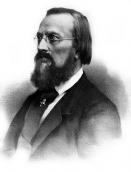Nicholas Kostomarov
Nicholas Kostomarov (4 (16) May 1817 – 7 (19) April 1885) – famous Ukrainian historian, folklorist and writer.
His father was a wealthy landowner in Ostrohozhsk County (Voronezh province), his mother – his serf – Ukrainian. After his father's death in 1828, Nicholas was a slave to the heirs, who gave him freedom in exchange for a waiver of parental estate.
Nicholas studied at private boarding schools in Moscow and Voronezh, and even then showed brilliant skills. In 1833 – 1837 years he studied at Kharkov University. In 1839 – 40 years he had published in Kharkiv two collections of his poems, in 1844 defended his master's thesis "".
In 1845 he began teaching at the Kiev University. In Kiev, he met several young Ukrainian patriots – Panteleimon Kulish, Basil Belozersky, Nicholas Gulak, Taras Shevchenko. At the meetings they read poetry, spoke about Ukraine and fashionable at that time Slavophilism, exchanging their new nonprinting works, among which was "", written by Kostomarov.
These tea parties turned out to suspects, members had been arrested by gendarmes, and all participants in the meetings were delivered in St. Petersburg. There gendarmes created of the "Ukraine-Slavic society" (in historiography adopted the name "Cyril and Methodius society"). May 30, 1847 Nicholas 1st confirmed severe penalty to its members. Kostomarov was sentenced to one year imprisonment in the fortress and subsequent deportation to forced service (during this exile he served in Saratov).
The arrest and punishment cripple Kostomarov's fate. First, his marriage with Alina Kragelska had been broken. Second, his professor's career was destroyed, and, therefore, he had no opportunity to create his own scientific school. Thirdly, the prohibition of his early poetry (it was "appendage" to the main sentence) distracted Kostomarov from continuing literary work and directed his efforts towards science, mainly historical studies. But in the exile he cut off from the research centers and very limited in the work of the historian.
Only June 27, 1855 the new emperor Alexander 2nd Kostomarov. In 1859 – 1862 years he taught history at St. Petersburg University, but later he was not allowed to teach in any university.
Kostomarov on focused on the job in the Archaeographical Commission, where prepared and published 11 volumes of "Acts about history of Western and Southern Russia" (1863 – 1882, vols. 1 – 9, 12, 13). At the same time printed the abundant flow of his historical monographs from which he compiled a collection of 21 vol.
This monographs can be grouped into two main cycles. First – a history of Cossack Ukraine from the late 16th century to the time of Mazepa and Mazepists. The centerpiece here is the book "Bohdan Khmelnytsky". The second series of monographs on the role of people in the history of Russia: "Northern democraties", "Rebellion of Stenka Razin", "Sad time of Muscovy" and others.
In 1875 – 77 years Kostomarov wrote his , which is an important source for his life and work.
Kostomarov died in St. Petersburg, buried on Volkov cemetery.
All works of Kostomarov as an historian, folklorist and writer imbued with the idea of nationality. Kostomarov had proposed that people may be the subject of historical science (not only the state and rulers). He thus opened the possibility to study the history of the Ukrainian people, for which under prevailing at the time state approach had no place. For the folk songs Kostomarov look like on a mirror where one can see the reflection of government activities and political events in the masses.
Literary heritage of Kostomarov relatively small. His early works imbued with the spirit of romanticism; at the time of Cyril and Methodius society he was certainly influenced by huge muse of Shevchenko. His prose works appeared as if on margins his historical studies (for example, the story "Son" highlights Razin's rebellion, "Chernihivka " – a time of Ruins in Ukraine).
Kostomarov's fate was typical for talented Ukrainian in 19 cent. As they all, Kostomarov had to work in the institutions of empire; all his scientific and most literary works written in Russian. But his tireless work formed the way fot the next generation of Ukrainian writers and scientists.
M. Zh., June 12, 2014.

